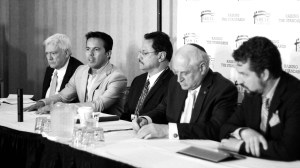In this series

A massive new study on American Jews reveals some interesting tidbits about how today's Jewish community views Jesus, and how American Christians view Jewish identity and Israel.
Among many findings, Pew Research asked American Jewish adults, "What is compatible with being Jewish?" They found that the majority believe a person can be Jewish even if he or she works on the Sabbath (94%), is strongly critical of Israel (89%), or does not believe in God (68%).
In stark contrast: "Believing in Jesus, however, is enough to place one beyond the pale," notes Pew. Only 34 percent say that believing Jesus was the Messiah is compatible with being Jewish. (Jews of no religion (47%) are more likely than Jews by religion (30%) to say this, as are those with a high school diploma or less (48%) vs. college graduates (28%).)
However, the fact that 1 out of 3 American Jews today do see belief in Jesus as compatible with being Jewish (including 35 percent of Ultra-Orthodox Jews) may seem surprisingly high for those who follow the fortunes of Messianic Jews. For example, a new multi-million dollar Messianic center (previously profiled by CT) that recently opened in an Orthodox Brooklyn neighborhood has drawn much scrutiny. (Among top concerns told to the Jerusalem-based Times of Israel: "They will make inroads because they are offering free services to the community and unconditional love.")
Additionally, when Pew Research asked "What does being Jewish mean in America today?", majorities say remembering the Holocaust (73%) and leading an ethical life (69%) is essential to their Jewish identity. Of interest: More than twice as many say "having a good sense of humor" (42%) is essential than "observing Jewish law" (19%).
On the subject of Israel, researchers found that American evangelicals feel more strongly than American Jews on several topics. For example, "Twice as many white evangelical Protestants as Jews say that Israel was given to the Jewish people by God (82% vs. 40%)," notes the Fact Tank blog.
Pew Research also examined the "interesting groups" of Americans of Jewish background who are no longer Jewish, as well as Americans who are not Jewish by religion or heritage yet have a self-proclaimed Jewish affinity.
The majority of both groups are currently Christians: 70 percent of Americans of Jewish background, and 64 percent of Americans of Jewish affinity. Messianics remain quite small: 2 percent of those of Jewish background, and 3 percent of those of Jewish affinity.
Yet, to go back to the "Jesus question," Pew Research found:
The majority of people of Jewish background (67%) and people with a Jewish affinity (72%) say that someone can be Jewish even if they believe Jesus was the messiah. By comparison, three-in-ten Jews by religion (30%) and about half of Jews of no religion (47%) believe this.
Nearly 1 out of 3 Americans of Jewish affinity (31%) "say they are Jewish because Jesus was Jewish." By contrast, nearly 1 out of 10 Americans of Jewish background (8%) say the same.
More than half of Americans of Jewish background (58%) say they were raised as Christians. Nearly nine-in-ten of Americans of Jewish affinity (86%) say the same.
Americans of Jewish background and Jewish affinity also have higher levels of religiosity. Notes Pew:
Roughly six-in-ten respondents with a Jewish affinity (62%) and of Jewish background (58%) say religion is very important in their lives, compared with 31% of Jews by religion and just 8% of Jews of no religion. Those of Jewish background and Jewish affinity also are far more likely to say they are absolutely sure God exists (72% and 81%, respectively) as compared with both Jews by religion (39%) and Jews of no religion (18%).
Additional coverage worth reading of the study's Jewish angles include The New York Times, Religion News Service, CNN's Belief Blog, and the Associated Press.















